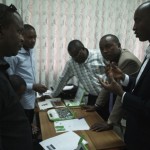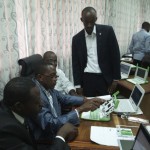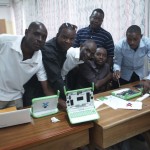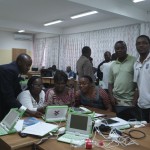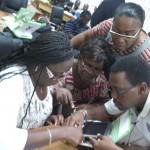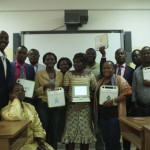Every afternoon, when I go to pick up my daughters from school, I ask them “What did you do in school today?” Several years into the ritual, it has become a habitual question now, and I get varying degrees of responses from them, depending on their mood, and what they feel like sharing. To me, it’s of paramount importance to hear it from them. At least until they stop sharing with me ![]() 7800 miles away, the parents of Anshu in Bhagmalpur, India would like to know as well. They are curious about what Anshu does on his OLPC XO laptop all day. In Jamaica, where I now have three projects, parents of John also want to know how he spends his time on his OLPC laptop. The teachers are curious about time spent on different activities (apps in OLPC/Sugar parlance). The principal wants to know if the sudden leap in math scores has anything to do with the children playing with Tuxmath every chance they get! Feedback is important. In fact, there is now an entire field of “Learning Analytics” that is growing rapidly. If you’ve used a “dashboard” in SalesForce or Drupal, then you know where this is going.
7800 miles away, the parents of Anshu in Bhagmalpur, India would like to know as well. They are curious about what Anshu does on his OLPC XO laptop all day. In Jamaica, where I now have three projects, parents of John also want to know how he spends his time on his OLPC laptop. The teachers are curious about time spent on different activities (apps in OLPC/Sugar parlance). The principal wants to know if the sudden leap in math scores has anything to do with the children playing with Tuxmath every chance they get! Feedback is important. In fact, there is now an entire field of “Learning Analytics” that is growing rapidly. If you’ve used a “dashboard” in SalesForce or Drupal, then you know where this is going.

Anshu checking his Wi-Fi signal in Bhagmalpur, India
OLPC laptops use Sugar as their learning environment. Sugar uses the metaphor of a journal to store the work of a child. The Journal allows for personal reflection on what the child does, and pick up where she left off and continue to build. Think of the Journal as a mini dashboard for the child. The concept of a file is gone. How nice! The only reason we call them “files” is because we have grown up in a world of filing cabinets (I have one in my office), with folders holding files and documents. That’s our world of metaphors. What does a child in the Amazon know of filing cabinets?!

A Sugar Journal
While the Journal is detailed enough to give the child a view of her world, as a parent, I would like to know about aggregates. How often does my daughter read a book, as opposed to looking up Wikipedia? How often does she play the Maze, Memorize, and her other favorite activities (apps)? Frequency counts are interesting in giving me a heads-up on how she spends her time. When does she read? A pattern of use across the time of day is useful too. To that end, we now have the Analyze Journal activity. It provides a summary view of some of the items in the Journal. Think of this as yet another dashboard, but perhaps for a parent or a teacher. As a parent, I can certainly relate to this.

The Analyze Journal activity
The upcoming XO Tablet, is a significantly different product. It is also a significantly different Androidtablet. I saw an early preview back in January, but haven’t seen the finished product yet, so some of this writing is based on the video. Here are a few things I know. It does not run on Sugar, but it does have some interesting features. The Android tablet allows the parent to create accounts for the children. Each account then can have some degree of parental guidance and protection. For instance, I am not a fan of letting my daughters get on to the Internet without supervision. Heck, I don’t even let them watch Disney, without supervision! So, the fact that you can turn Internet access on or off in a profile is very useful. So is the feature of knowing what your child has been doing on the tablet.

Settings per child (screen shot from video)
The XO Tablet implements some features of the concept of a journal. Looks like it is called the Parent Dashboard. One can keep up with some of the progress of one’s child by category. I’d be curious to explore more of this feature.

Parent Dashboard (screen shot from video)
The XO Tablet also allows for switching out of this “Dreams” interface to a full-fledged Android tablet, and includes access to the Google Play store (as the video indicates. See below).

Switching from Dreams interface to full Android (screen shot from video)
The XO Tablet runs on Android, so the Sugar learning environment that we are used to on the OLPC XO laptop isn’t compatible with it. I don’t think we’ll see any of the “View Source” functionalities that we see in Sugar. Android is Open Source (Apache license), while Sugar is Free Software (GPL). The development models and motivations around those kinds of licenses are significantly different. Sugar is developed by Sugarlabs, which sees contributions by OLPC employees and Sugar developers. The “Dreams” interface on the XO Tablet is being built by MorphOSS LTD., a company in New Zealand, and as far as I can tell, the software is neither Free nor Open Source. The tablet also lacks a tactile keyboard, so a fair bit of “production” is ruled out. Imagine writing a letter to a friend on a touch keyboard. I have, and it sucks. That’s a peeve I have against tablets, so it’s not specific to the XO Tablet. Of course, one could argue that in this new age of machines, who needs to write? Simply hit record and communicate! Captain Picard’s “Tea, Earl Grey, Hot” is around the corner! However, with the advent of HTML 5 applications for Sugar, and other interesting developments stemming from Android as a base (including Firefox Phone, Ubuntu Touch and others where one can run non-Android systems on an Android-derived Linux base (a different Linux distribution in chroot), I’m hopeful that there will be some degree of convergence. I realize that the XO Tablet is geared for the “first world” markets, but there are plenty of good ideas on it, and while the under-developed world will still need (note: need is different from want) water resistant, dust resistant, robust low-powered laptops – and we have the XO-4 for that – this XO Tablet should be interesting to use in the so-called developed world. It sounds like it will be available via retail outlets soon. I wish the XO-4 was available retail as well, but that’s another blog – in logistics, supply chain management and VAR channels ![]() Here’s the marketing video:
Here’s the marketing video:







